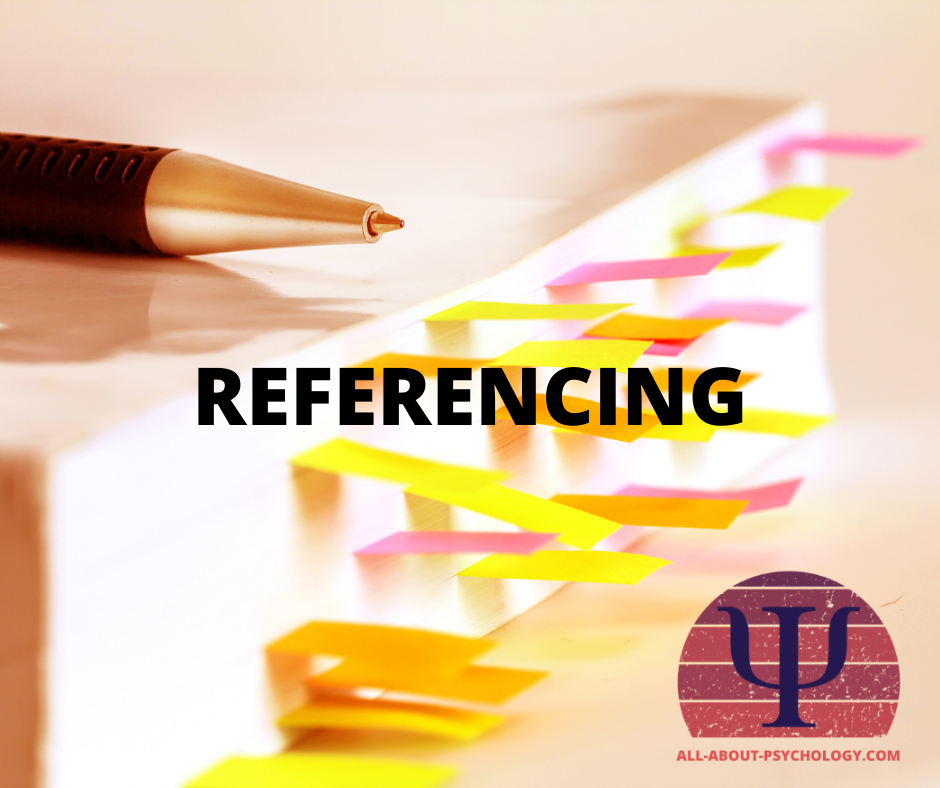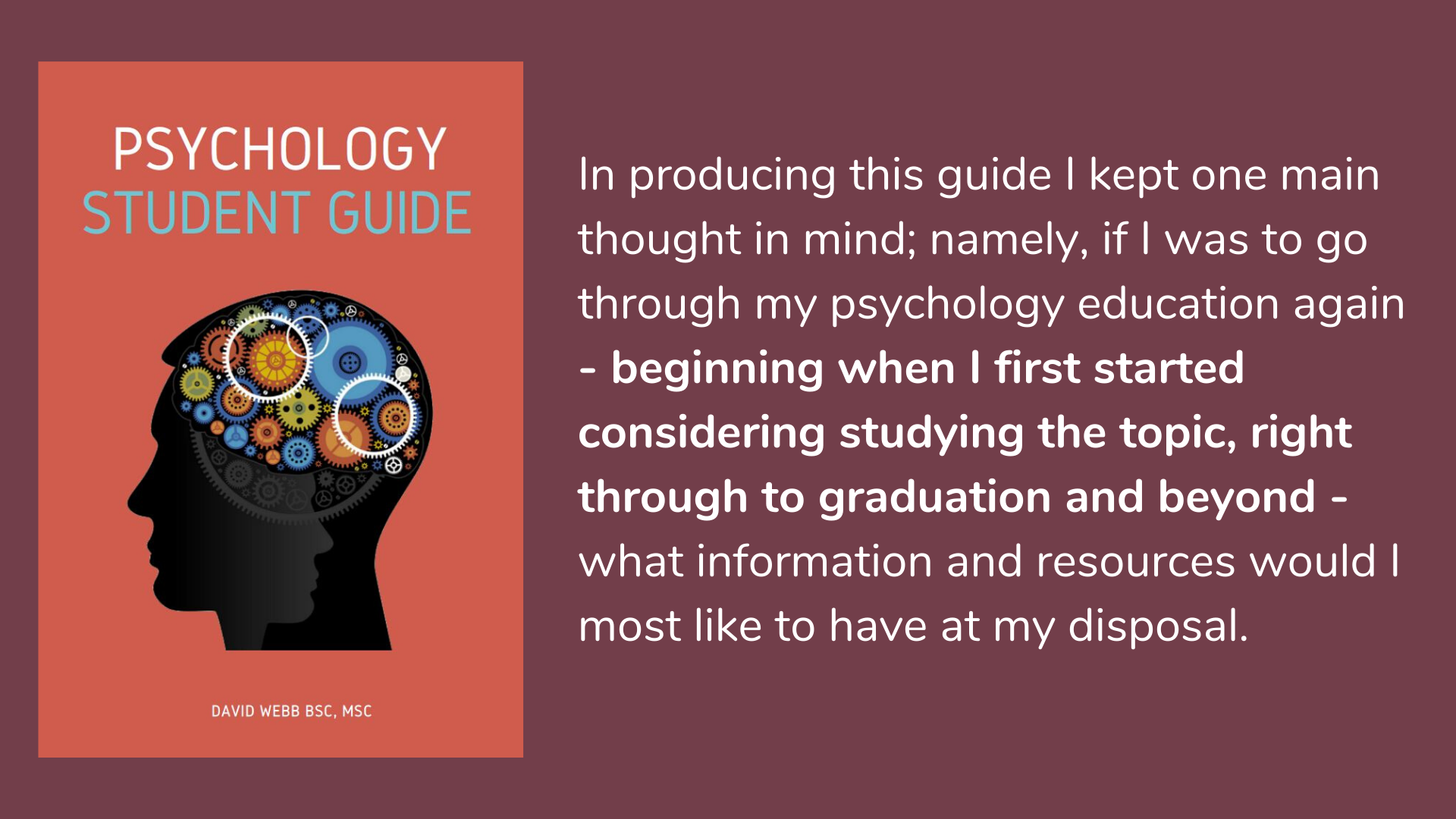Referencing in Psychology
David Webb (Owner, writer & host of All-About-Psychology.Com)
Many students underestimate the importance of referencing but from an academic perspective, referencing is vitally important.
The cornerstone of any academic writing be it a term paper, essay, research project or dissertation is the dissemination of ideas. References, i.e., source material based on the views, opinions and research findings of others provide the conceptual framework necessary to engage in analytical debate.
Imagine you had to write an academic answer to the following question without references.
Psychology is Unscientific: Discuss
Impossible. However, passionate or valid your personal view on the topic is e.g. "I disagree, I actually think psychology is scientific because..."
I'm afraid from an academic perspective an unsubstantiated personal opinion is not worth the paper it's written on. This is why the convention within academia is to write in the third person.
A key aspect of referencing in psychology that students tend to overlook is the fact that references allow the reader to identify, access and use the material themselves.
It is also crucial to reference properly so that there can no possible suggestion of plagiarism i.e. taking and using the writings of others and passing it off as ones own. Plagiarism is an extremely serious offence and can result in a student been expelled if found guilty.
When you begin your school, college or University course you should at some point (usually in the first week) be given specific guidelines on the standard referencing style required. In most cases this will be the APA referencing format, although many UK institutions favor the Harvard system.
Make sure you have these guidelines to hand whenever you do any form of academic writing.
Most Common Referencing Mistake
Without doubt the most common referencing format mistake relates to obtaining source material via electronic means e.g. the Internet.
Most Internet references will have been accessed via a specific web page, however, remember there are other Internet sources e.g. newsletters, online newspapers, e-books etc.
APA style referencing guidelines suggest that an Internet source should provide a document title or description, a date (either the date of publication or update or the date of retrieval), an Internet address (URL) and Whenever possible, the author(s) of the source material as well.
CLICK HERE For more information on APA guidelines for website references.
Top Referencing Tip
Whenever you do an academic assignment make sure you write down the full reference of each source as you find it. Many psychology students, including myself in the past, fail to do this.
Taking notes from the source for possible inclusion in the written assignment is fine but if you do decide to use the material, you can find yourself wasting hours of your valuable time trying to retrace the books you used, returned to the library etc.
This problem is particularly acute when students are doing a thesis or dissertation, involving literally hundreds of references.
Writing references as you go along may mean you record a host of references that you don't actually end up using, however, the time wasted doing this pales into significance compared with the alternative.
Quality APA Referencing Resources
- Instructional Aids (Tutorials/Webinars/Handouts)
Psychology Student Guide
The revised and updated PDF version of the International #1 Best Seller! Psychology Student Guide draws on my experience as both a student and teacher of psychology.
Guide Highlights:
- Priced super low with students in mind.
- Contains an invaluable collection of outstanding resources.
- Provides information on every type of psychology you can think of.
- Includes detailed guidance notes to help you with your psychology project.
- Gives you access to free peer reviewed journal articles.
- Shows you why research methods and statistics should be embraced, not feared.
- Tells you all you need to know about the study and practice of psychology.
- Lets you explore the less serious side of psychology.
- Invites you to connect with thousands of psychology students online.
"This guide is simply amazing. I am a junior in high school considering psychology as a career and this guide truly informed me. Great work!" (Danielle, United States)
Available to download immediately on Amazon
Recent Articles
-
Tourettes: Understanding Tourette Syndrome Beyond Stereotypes
Feb 23, 26 06:01 AM
Learn what tourettes really is, why swearing is a myth for most, and how education reduces stigma around Tourette syndrome. -
Psychological Impact of Catastrophic Injury & Recovery
Feb 17, 26 02:26 AM
Explore the psychological impact of catastrophic injury, including trauma, identity shifts, resilience, and long-term mental health recovery. -
Psychology Articles by David Webb
Feb 10, 26 06:31 AM
Discover psychology articles by David Webb, featuring science-based insights into why we think, feel, and behave the way we do.
Please help support this website by visiting the All About Psychology Amazon Store to check out an awesome collection of psychology books, gifts and T-shirts.






